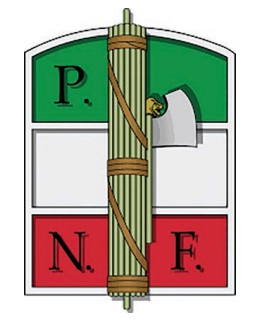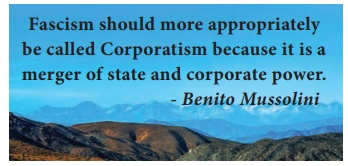Political Ideologies - Fascism | 11th Political Science : Chapter 7 : Political Ideologies - Part-I
Chapter: 11th Political Science : Chapter 7 : Political Ideologies - Part-I
Fascism
Fascism
Benito Mussolini founded a totalitarian party, movement and ideology in
the inter-war period and ruled Italy for more than two decades. Fascism in
Italian language has its origin in the word Fasci meaning the bundle of rods
bound with a red cord round an axe helve. In Italian tradition, this symbol is powerful as it was borne
by the magisterial attendants before the Roman Consuls as symbol of political
power. The bundle of rods signifies unity and strength and Benito Mussolini
chose the nomenclature to arouse the emotions of the cadre.
The most important factor for the emergence of Fascism can be attributed
to the socio-economic problems of Italy in the post-war period. Though it was
on the side of the allied powers in the First World War, there was a huge
popular disappointment that it did not receive benefits from the post-war
settlement. The country suffered from numerous socio-economic problems like
unemployment, inflation, stagnation and instability in industrial sector.
All sections of Italy like workers, farmers, middle class and even rich
classes faced war-related miseries. Benito Mussolini, being a dangerous
demagogue, capitalized on this widespread discontent and conducted a ‘March on
Rome’ in 1922. The political authorities in the face of fascist intimidation
capitulated and Mussolini and National Fascist Party captured power without any
violence.
National Fascist Party (Partito Nazionale Fascista)

Basic Characteristics
Fascism preached and practiced aggressive nationalism. Fascism
proclaimed that Italy is the greatest nation in the world and created hatred
against other nations and people. Fascism pursued imperialism both in theory
and practice. Its expansionist drive re-ignited colonial rivalries in Africa
precipitating the Second World War. A Fascist writer Giovanni Gentile wrote the
book ‘Doctrine of Fascism’. He said that the Fascist State is a will to power
and empire. The Roman tradition is here a powerful force. According to the
doctrine of Fascism, empire is not only territorial or military or mercantile
concept, but a spiritual and moral one. One can think of an empire, that is, a
nation, which directly or indirectly guides other nations, without the need to
conquer a single square kilometer of territory. Mussolini believed that the
Fascist State is the ‘Third Rome’, a worthy successor to the First Ancient
Roman Empire and second the Renaissance Rome that disseminated the seeds of
renaissance throughout Europe.
Fascism extolled the virtues of war. Mussolini infamously stated ‘war is
to man what maternity is to woman’. It deprecated peace as a slogan of the weak
and cowardly. Fascism sought to honour women as ‘reproducers of the nation’.
Fascism rejected the idea of a limited State. It enthusiastically
followed the concept of totalitarianism. Mussolini exclaimed, ‘Everything
within the State, nothing outside the State, nothing against the State”. The
State was empowered to create a radically new society. It exercised a complete
control over the minds and actions of its citizens. Fascists provided a
positive outlook to the concept of totalitarian State contending that the powerful
authoritarian State is vital for the metamorphosis of Italy into a mighty
nation and moulding of its citizens into politically-active brave people.
Fascism considered communism as its mortal enemy and endeavored hard to
suppress it. The great Marxist thinker of Italy, Antonio Gramsci was jailed for
20 years. The official prosecutor in that case ended his peroration infamously
demanding the judge ‘we should stop this brain working for 20 years’”. Fascism
banned political parties, movements and writings supporting communism.
Ideologically, it repudiated the Marxist concepts of State, society,
class and revolution. As against the class-ridden society of communism, Fascism
supported the organic unity of the State.

Notable fact of the Fascist State is its nature as a Corporate State.
Every profession, trade or occupation possessed its own corporate organisation.
The national objectives of the State were given primacy over everything. The
corporate State was promoted to remove any conflict between employers and
employees. Mussolini firmly believed that the disputes between the business
classes and labour should and could be removed through the system of corporate
bodies.
The workers were sternly told that strikes were illegal. They came to be
affected greatly as wages were fixed low by the Fascist State and party. The
corporate organizations suffered from corruption and inefficiency. The
corporate State was the bedrock of Fascist economy but trampled upon the rights
of the workers.
Criticism
Fascism was the most powerful totalitarian State that mankind had ever faced. It was undemocratic. Fascism was attacked as an opportunistic, intellectually dishonest ideology as it changed frequently its core ideological principles and postures. Though Fascism and Nazism had been cruel collaborators in inflicting massive death and destruction on humankind in the Second World War, Fascism as an ideology was more coherent and therefore continues to be used as a term even in the 21st century to assail dictators and totalitarian States.
Related Topics